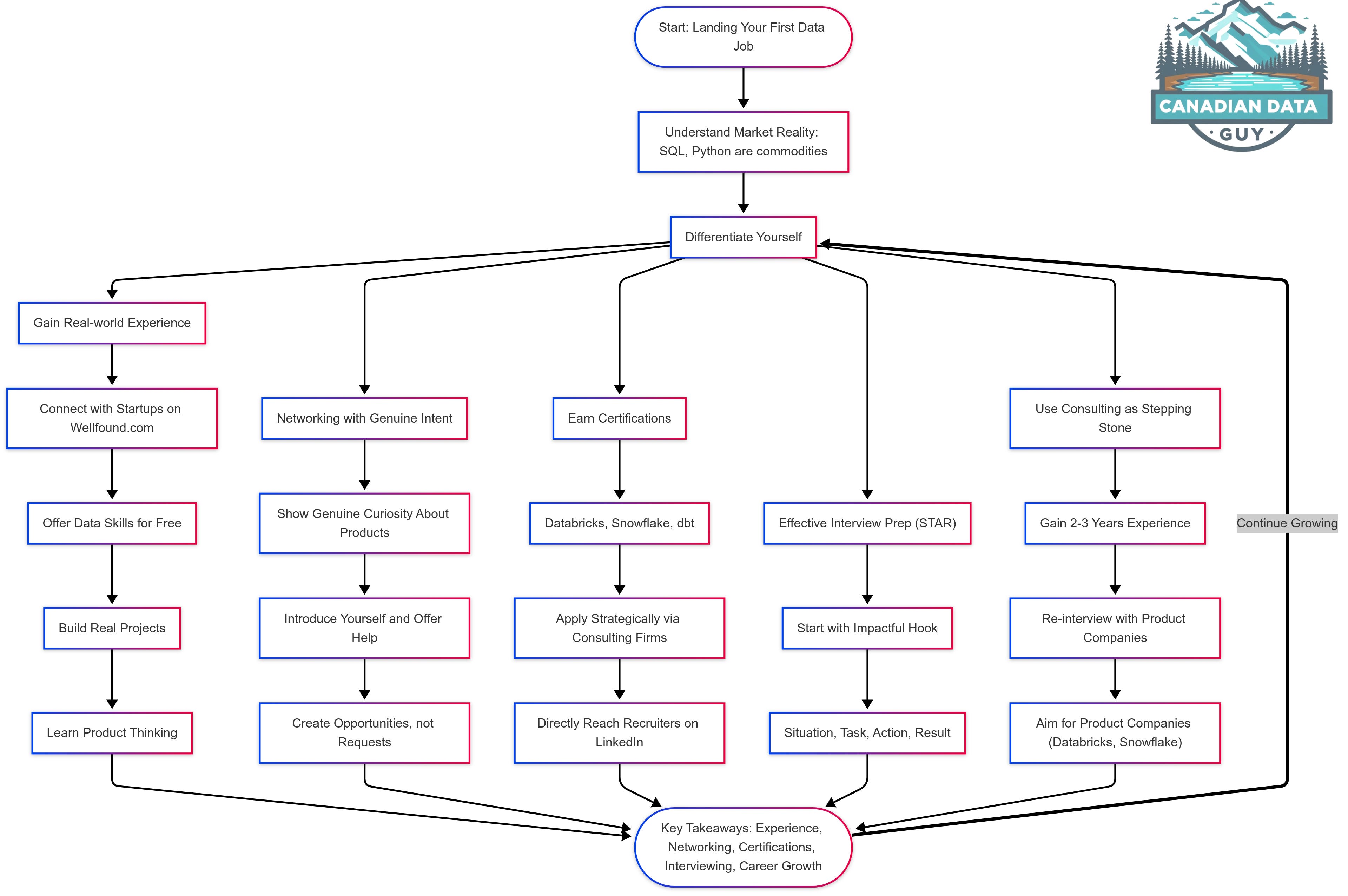Your Degree Isn't Enough: How to Actually Break Into Data
Practical Tips for Building Real Experience, Networking Authentically, and Winning Interviews
Landing your first job in data can seem overwhelming, especially when everyone around you knows Python, SQL, and visualization tools like Power BI. Technical skills alone are no longer enough to differentiate yourself in today's competitive job market. Here's a strategic roadmap to landing your first role in data, going beyond the basics and showcasing how you can truly stand out.
Accept the Market Reality
In any room filled with aspiring data professionals, you'll find that nearly everyone knows Python, SQL, Power BI, or Tableau. These skills, while essential, are now commodities—they’re expected rather than exceptional. Even personal or college projects have become commonplace.
To land your first job, you need to set yourself apart.
Differentiate Yourself: Gain Real-world Experience
How can you differentiate yourself, especially without prior work experience? One highly effective strategy is engaging directly with startup founders.
Step-by-Step Approach:
Identify Founders and Startups: Visit platforms like Wellfound.com to connect with early-stage startups—seed-funded or even pre-funded ideas.
Offer Value First: Proactively offer your data skills for free initially. While the idea of unpaid work may seem counterintuitive, the true compensation comes in the form of valuable experience, mentorship, and exposure to product-driven thinking.
Build Real Projects: Working with startups provides real-world projects, solving genuine problems. When interviewing, you’ll have concrete examples of your work to share, far superior to hypothetical or generic projects.
Gain Product Thinking: Startups will help you learn product development, user needs, and business strategy—skills rarely developed through traditional academic projects.
Networking with the Right Mindset
A common mistake people make at networking events is immediately asking for jobs or favors. Trust that the person you're speaking with already knows you're looking for opportunities. Instead, approach networking events with genuine curiosity. Seek to understand what products and challenges people are working on. If the conversation naturally leads to them asking about your interests, then introduce yourself, clearly express your intent, and genuinely offer to help on a project for free. Your goal is simply to create opportunities. Most good people won't let your contributions go unpaid indefinitely, but let them initiate compensation conversations.
Get Certified: Beyond Degrees
Degrees are common; certifications stand out. Specializing in high-demand platforms makes you more attractive to employers.
Recommended Certifications:
Databricks Certifications
Snowflake Certifications
dbt (Data Build Tool) Certification
Highlight certifications prominently on your resume (top-left corner) to immediately capture recruiters' attention.
Target Your Applications Strategically
Certifications aren't just decorations; they open doors to companies actively seeking specialized talent.
Leveraging Certifications:
Consulting firms (Deloitte, Accenture, Slalom) partner with platforms like Databricks and Snowflake. Companies needing certified specialists approach these consultancies.
Research prominent Databricks or Snowflake consulting partners, identify open roles, and directly apply.
Go beyond applying—reach out personally to recruiters via LinkedIn, clearly showcasing your certifications and enthusiasm.
Prepare Effectively for Interviews: STAR Methodology and Hooks
Due to the short attention span of interviewers, begin your answers by clearly stating the impact or result upfront within the first 30 seconds. Follow this hook with the Situation, Task, and Action details.
Example Hook:
"I saved a million dollars in licensing costs and significantly reduced CO2 emissions by building a real-time data system using Databricks that optimized drill bit movements during oil exploration."
Notice how this statement immediately highlights both financial and environmental impacts, making it compelling and memorable.
STAR Methodology Recap:
Result First (Hook): State your biggest impact immediately.
Situation: Describe the scenario briefly.
Task: Clarify your specific responsibility.
Action: Detail the steps you took.
Practicing this method ensures your answers are concise, impactful, and easy for interviewers to remember.
Leverage Consulting Roles as a Stepping Stone
Your initial goal is breaking into the industry. Consulting roles offer valuable exposure and practical experience. After building experience over 2-3 years, aim higher:
Target product companies like Databricks or Snowflake directly.
These roles typically offer significantly better compensation, career growth, and specialized experience.
Key Takeaways
Real-world experience: Prioritize working on actual startup projects over hypothetical college projects.
Networking: Approach networking events genuinely, seeking understanding and creating opportunities rather than directly asking for jobs.
Certifications: Invest in high-impact certifications that directly align with industry demands.
Strategic networking: Proactively connect with recruiters, leveraging your specialized skills.
Interview Preparation: Master the STAR methodology with impactful hooks to clearly demonstrate your value.
Career trajectory: View consulting as an entry point, not the end goal.
Landing your first data job requires strategic moves beyond just technical skills. By adopting this proactive, differentiated approach, you'll set yourself apart and significantly increase your chances of success.


